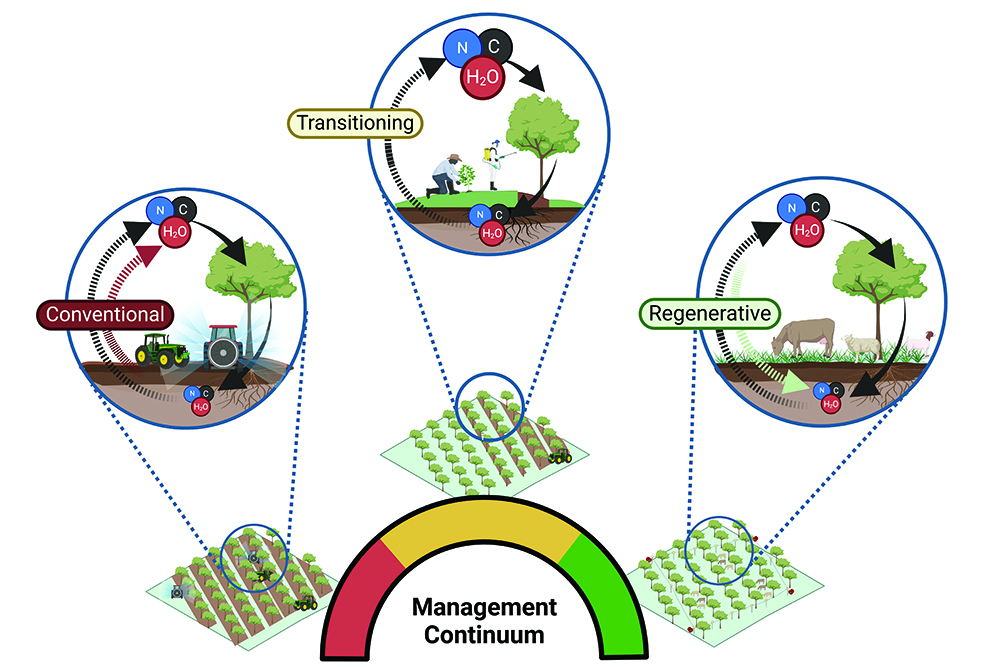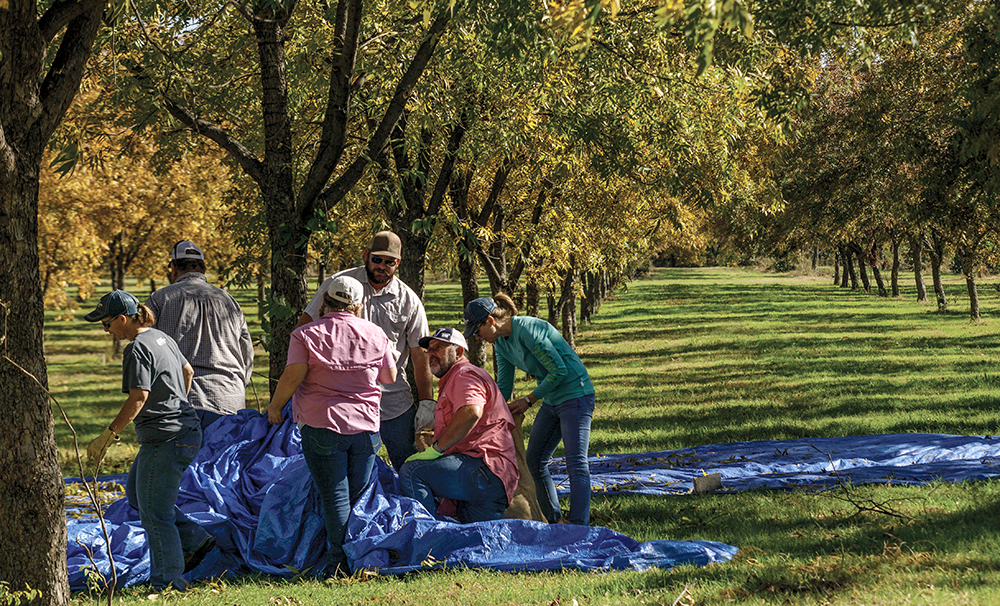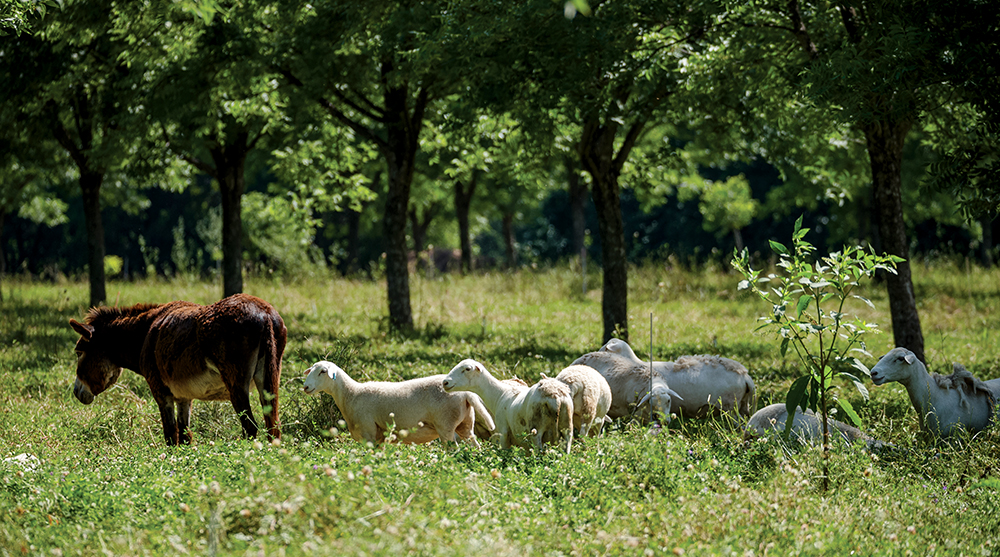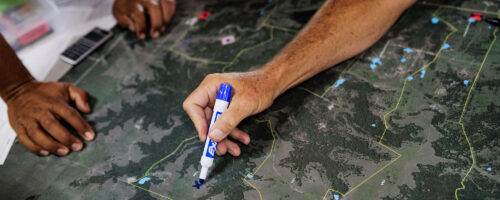Silvopasture Synergy in the Orchards
What happens when you make soil health the top priority for pecan orchards? Noble’s pecan strategy research team is looking for answers in a comprehensive six-year study, and the two silvopasture orchards on Noble Ranches play an important role.
Prior to the spring of 2021, the 25-acre pecan orchard of Noble’s Conrad-McMillan Pecan Farm was managed like many conventional orchards. Ranch facility manager David Miller used herbicides to control grass and weeds in 6-foot strips on both sides of the tree rows and sprayed fungicides and insecticides up to eight times a year to protect the six types of improved pecan cultivars growing there. The orchard was not grazed.
At the Noble Red River Ranch, ranch facility manager Kevin Pierce managed the 300 acres of native and older improved pecan cultivars somewhat less intensively, but did mow and spray herbicides at times, especially to try to control the honeyvine milkweed that would wrap around equipment at harvest. He also sprayed for fungal diseases and harmful insects, more so in the non-native groves. Cows and stocker cattle were let in to graze, especially for the 90 days of good grazing on cool-season annuals March through May.
This spring marked three years since the start of the Noble Ranches’ overall transition to regenerative ranching, with faith in the belief that using silvopasture while focusing on soil health will be good for the soils, the livestock, nut production and even producer well-being. They “went cold turkey” in the pecan orchards, Miller says, ceasing all chemical and synthetic fertilizer applications, although he still irrigates when needed.
Today, both managers describe orchards full of more plant, insect and animal diversity now that they’ve stopped spraying. (See sidebar p. 8) They use adaptive multi-paddock grazing to rotate cows, calves and stockers as well as sheep and goats to feed on the plentiful forage (including the honeyvine) and benefit from the shade. This is the practice of silvopasture — a regenerative system that deliberately integrates livestock and trees, with benefits to both enterprises and especially to soil health.
Many commercial pecan producers, however, are highly data-driven as they strive to boost nut production and profits, says Nikki Charlton, Noble Research Institute systems research manager and co-principal investigator for a major Noble pecan strategy research project now underway. Such growers understandably need to see numbers and successful examples to feel confident about changing how they’ve managed their orchards for years.
That’s where the combination of Noble Ranches and Noble researchers comes in. The pecan strategy research team at Noble, led by Charlton and co-principal investigator Lauren Jones, Noble senior research associate, has set out to monitor and collect data across a continuum of management practices in producer pecan orchards and on Noble Ranches. Those practices range from high-input, fully conventional orchard management, to those in transition to more regenerative practices, all the way to the Noble orchards, where the primary focus is soil health, using silvopasture and no chemical inputs.

MONITORING SOIL AND ORCHARD HEALTH IN DIFFERENT SYSTEMS
“Our hypothesis is when you apply more soil health principles, soil health should improve, leading to healthier trees and healthier nuts,” Jones says. She and the team hope, over time, to be able to put numbers to how different management practices impact soil health, nut nutrient value and producer profitability.
In 2022, Noble began monitoring soil health changes at 67 sites established in the orchards at both the Conrad-McMillan Pecan Farm and at Red River Ranch. The on-ranch monitoring was a precursor to Noble launching its six-year-long “Pecan Strategy Research” monitoring project in 2023, as of this writing collaborating with 22 pecan producers representing 2,200 acres of pecans across Texas and Oklahoma, two of the top five pecan-producing states.
As it monitors 151 sampling sites (producer and Noble), the Noble research team is:
- Collecting soil samples for soil health and microbial community structure testing.
- Collecting leaf samples for tree nutritional status.
- Developing nutrient assays to measure nut nutrient density and phytochemical composition from nut samples.
- Using scorecards to assess orchard health, including disease and insect reports.
- Preparing to do economic analysis that will compare profitability across the different management styles expressed as profit per acre.
- Working with an Oklahoma State University pathologist to monitor soil and nut samples for foodborne pathogens in order to inform producers regarding grazing regulations under the Food Safety Modernization Act.
- Defining lab protocols to identify bat species as well as the pecan pests they eat, using DNA extracted from bat guano. (The hope is that attracting bats to orchards can be a natural way to reduce pest damage of pecans.)
The project got a boost this year with the receipt of a $295,000 grant from the Greenacres Foundation that will help support the research focused on improving soil health using agro-ecological principles while improving the resiliency of agricultural lands. The team also has a grant for the project from the Oklahoma Department of Agriculture, Food and Forestry.

WORKING WITH NATURE IN NOBLE ORCHARDS
Noble is in a unique position to both study and demonstrate what happens when you partner fully with nature in silvopasture pecan orchards.
“Regenerative agriculture is about trying to reduce inputs and work with nature,” Charlton says. “All of the decisions you’re making can really impact the system as a whole.”
Currently, the producer orchards in the study are managed along a continuum of practices, from fully conventional to soil-centric management. The study is documenting all those practices and the outcomes to track the differences. At Noble, the management of the Conrad-McMillan and Red River ranches is based on soil health versus maximizing pecan production as the top priority, hence the choice to eliminate inputs.
Being able to capture data from input-free management at Noble is important, because “most producers might not be willing to make the decision to completely eliminate everything,” Jones says. The Noble pecan strategy study is a way to look at the results over time and provide that information to producers to help them in their management decisions.
SEEING SILVOPASTURE IN ACTION
The research team holds an annual pecan producer workshop to share research updates with participants and foster peer-to-peer networking. At the 2024 workshop in Ardmore, tours of the Noble orchards gave producers interested in incorporating livestock in their orchards the opportunity to see the fencing infrastructure in an orchard with irrigation.
In the Conrad-McMillan orchard, Ruby the guardian donkey watches over her flock of hair-sheep ewes and lambs as they graze in small paddocks in the orchard. Charlton recalls how excited the producers were to see how Noble uses temporary fencing to graze the orchard successfully without harming the irrigation system, a major concern for some of them.
Jones says pecan growers who before the workshop may have thought grazing “sounded like a ton of work, or thought ‘I don’t know anything about it; I just can’t do it,’” now may see grazing their orchards as a possibility after hearing how peers do it as part of their day-to-day routine and viewing Miller’s success in person.

PARTNERING WITH PECAN PRODUCERS IN NEW WAYS
While Noble has worked with pecans and pecan producers for many years, its past research and related consulting were focused on the nuts and bolts of conventional pecan production and economics. Now, with soil health as the focus, both the research and producer interaction have shifted to a more holistic approach.
“We’re hoping to see if you manage with a focus on soil health, you will see improvement in soil health and higher profitability,” Jones says. Along the way, the pecan strategy team is already supplying producer participants with tools like the orchard health scorecard to track their own progress while Noble conducts (and pays for) the sampling and analysis in their orchards over the six years of the study.
The team already sees some of the participating producers making changes toward more regenerative practices, Charlton says, “and I think seeing the results from this study will help them feel confident in incorporating the soil health principles in their management decisions.
“The growers are vested in this. They want us to be successful, not just for themselves, but for the pecan industry as a whole,” she says. “And we couldn’t do this without them. We’re learning from them as well.”
Plus, Jones says, “it’s a really exciting study, and the fact that we get to work and engage with producers makes it a lot more fun.”



Comment